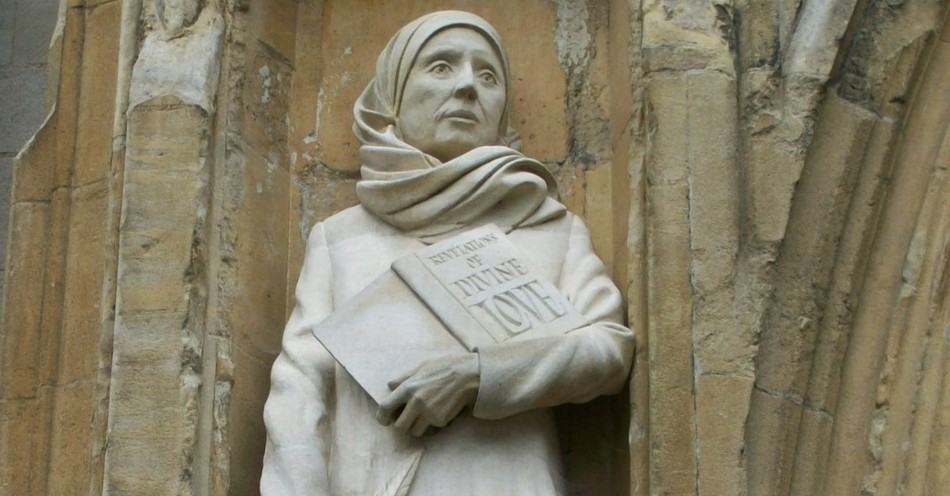We sometimes have many resources regarding certain saints and historical figures. Sometimes, however, others don't have a lot of details. Yet, the information about them that survives can be intriguing, life-changing, and thought-provoking. Today, we will focus on Julian of Norwich, a woman of faith who offered much to Christendom.
Where Was Julian of Norwich Born?
As previously stated, the resources about Julian of Norwich are limited to the point that it's hard to determine her name. Some have speculated that her name was derived from the church close to her, St. Julian's Church in Norwich, England. Records and personal writings indicate she was born in Norfolk, England, during the fourteenth century. While her exact birth year is also unclear, it is estimated to have been 1342 due to her writings in Revelations of Divine Love (more on that later). We are unsure where she was born, but records and writings describe her time as an anchoress in Norwich. Contrary to monks or nuns (who live away from society to form their own communities), an anchor or anchoress lives in solitude in a local town's church.
An anchorite's ascetic life is filled with contemplation and solitude. Like nuns, anchorites devoted themselves to the service of God while depriving themselves of worldly possessions. These people would live in small sections of a parish or cathedral. Julian of Norwich was no exception. Isolated in a small part of the cathedral, she would serve God in her prayers, writings, and attend to traveling pilgrims who made their way out to see her. She offered the pilgrims spiritual advice and wisdom, communicating through a small window between her room and the outside world. The anchorite life is an isolated, rigorous, and tiresome life. Julian of Norwich was one of the few who lived out their lives as an anchorite, living alone with her pet cat.
Upon her death, she described how she had miraculous visions at 30 that she would later record. In detail, Julian of Norwich recorded that her visions happened in May 1373, thus providing us with an estimated year. There is the theory that she lived up to 1416, based on references in her writings.
What Historical Events Did Julian of Norwich Experience?
During Julian's life, life was not easy for anybody in England or Europe, peasants or monarchs. Overcrowded towns resulted in poor, cramped living conditions. Politicians were concerned about the Mongolian Empire extending into the Middle East and Eastern Europe.
Over 25 million people died either through the Black Death, revolts, riots, or food shortages. London, England, had a population of 70,000 and lost over 30,000 people to the Black Death. Historians estimate 30-40% of the British population died from the Black Death.
More political issues followed the Black Death's turmoil. England passed the Statute of Laborers in 1351 to handle the maximum wages for the limited labor population. Then, in 1380, King Richard II passed an unpopular poll tax. The working-class agricultural laborers hit a breaking point and started the Peasant's Revolt. The revolt spread to Norwich and across England. While it lasted less than a month and failed as a social revolution, it led to successes like lower-class people protesting taxes.
As anyone can imagine, these were trying times for the church. Despite these dark times, the faith persisted and endured. Julian and others' writings show how people kept their faith going in dark times.
What Did Julian of Norwich Write?
Julian of Norwich is one of the Five Mystics, noted Catholic mystics in English history. She recorded her mystic experiences in his writings. One of her most recognizable titles is The Revelation of Divine Love.
Other works include Meditations and Showings, which focus on Western Christian spirituality.
What Are the Key Themes of Julian of Norwich's Theology?
Her work was more than just her writings on her visions. She also wrote about a poetic love for God, Christ's passion and death on the cross, and the Virgin Mary. Other topics in her writings involved love, sacrifice, and suffering of the Christian life and in God. For example, in the first chapter of Revelations of Divine Love alone, she covers the significance of the Trinity and Incarnation and the unity and beauty of God's connection to humanity's soul. As we can see by some of her quotes below, Julian of Norwich was an intelligent, poetic woman of God who constantly pondered about his wisdom, divinity, and more.
"Truth sees God, and wisdom contemplates God, and from these two come a third, a holy and wonderful delight in God, who is love."
". . . we need to fall, and we need to be aware of it; for if we did not fall, we should not know how weak and wretched we are of ourselves, nor should we know our Maker's love so fully…"
"God, of your goodness, give me yourself; you are enough for me, and anything less that I could ask for would not do you full honor. And if I ask anything that is less, I shall always lack something, but in you alone, I have everything."
"Grace transforms our failings full of dread into abundant, endless comfort . . . our failings full of shame into a noble, glorious rising . . . our dying full of sorrow into holy, blissful life. . . Just as our contrariness here on earth brings us pain, shame and sorrow, so grace brings us surpassing comfort, glory, and bliss in heaven . . . And that shall be a property of blessed love, that we shall know in God, which we might never have known without first experiencing woe."
Who Was Been Influenced by Julian of Norwich?
Her work was rediscovered in 1901 after a British Museum copy was transcribed. As a result, translations of her work multiplied and spread along with her life story. To this day, Julian of Norwich is one of the most influential church writers of the medieval period and became a great inspiration for theologians and continues to be for Christians, especially for those in the Catholic realm who may have a call to celibacy or the nunnery.
Due to her influence on the beauty and wonders of God, the Roman Catholic Church's catechism quotes Julian of Norwich's work to explain the draw to God and goodness.
She has also influenced several artists. Anglican poet T.S. Eliot took deep inspiration from Julian of Norwich and incorporated her famous "All shall be well" saying into his poem "Little Gidding."
In 1982, Sydney Charter released the song "All Shall Be Well," sometimes called "The Bells of Norwich."
Her life has also been explored in fiction: the 2023 historical fiction novel I, Julian by Dr. Claire Gilbert explores her life story and writings.
I will turn it over to Dave Graves of Christianity.com for more on Julian of Norwich's life.
Julian of Norwich FAQ: Her Life in Five Minutes
When I was half way through my thirty-first year God sent me an illness which prostrated me for three days and nights. On the fourth night I received the last rites of Holy Church as it was thought I could not survive till day . . ." So wrote Julian of Norwich, describing a series of visions or "showings" that came to her.
Some time earlier, she had prayed for three things: To understand Christ's passion, to suffer physically while still a young woman, and to receive from God the gift of three "wounds," which were real sorrow for sin, genuine compassion and a true longing for God. The intent of all these prayers was that she might die to herself and live to God.
It seemed that the second request, at least, was being heard. Julian was in great pain, her eyes dimmed, she became numb to the waist, her breath grew shorter and shorter. Everyone, including her mother, expected her to die.
Early in the morning on this day, May 8, 1373, Julian's pain suddenly left her. It came into her mind to ask God again that she might understand Christ's passion. At once, she saw blood flowing from an image of Christ. Later she declared, "The most precious blood of our Lord Jesus Christ is in truth both costly and copious," and she asserted that God would prefer us to wash our sins in it than in water.
Over a period of about five hours, from 4 A.M. until 9 A.M. Julian received fifteen visions. The following evening she received another which summed up and confirmed the first fifteen. The visions stressed the creative and sustaining power of God and his infinite love for that which he created. Christ's mother Mary appeared, setting a tone of reverence. "How reverently she marveled that He [Christ] should be born of his own creature, and of one so simple."
"It was at this time that our Lord showed me spiritually how intimately he loves us. I saw that he is everything that we know to be good and helpful. In his love he clothes us, enfolds and embraces us; that tender love completely surrounds us, never to leave us. As I saw it he is everything that is good."
Julian recovered her health and recorded her visions in a book called Sixteen Revelations of Divine Love. Either before or after her visions, Julian became an anchoress (a female hermit) and was visited by individuals who sought wise advice. After twenty years of meditation on her showings, she wrote a longer version of her book. Two or three copies survived into the twentieth century.
Were Julian's revelations from God? She upheld key doctrines such as the Trinity, emphasized the key virtue--love--and recognized salvation as coming through Christ alone. On the other hand, she shocked contemporaries by speaking of Christ as mother. Puzzled by sin and hell, she denied God's wrath and concluded that "everything will be all right," that all souls will eventually be saved. There are other difficulties in her showings. However, her writing represents the flowering of English Medieval mysticism.
Bibliography:
Deen, Edith. Great Women of the Christian Faith. New York: Harper, 1959.
Gardner, Edmund G. "Juliana of Norwich." Catholic Encyclopedia. New York: Robert Appleton, 1914.
Julian of Norwich. Revelations of Divine Love. Translated by Clifton Wolters. Penguin, 1966.
"Juliana." Dictionary of National Biography.
Last updated July 2007
("Julian of Norwich's Revelations" by Dan Graves, MSL, published on Christianity.com on May 3, 2010)
Photo Credit: Public Domain photo via Wikimedia Commons

This article is part of our People of Christianity catalog that features the stories, meaning, and significance of well-known people from the Bible and history. Here are some of the most popular articles for knowing important figures in Christianity:
How Did the Apostle Paul Die?
Who are the Nicolaitans in Revelation?
Who Was Deborah in the Bible?
Who Was Moses in the Bible?
King Solomon's Story in the Bible
Who Was Lot's Wife in the Bible?
Who Was Jezebel in the Bible?
Who Was the Prodigal Son?





.jpg)